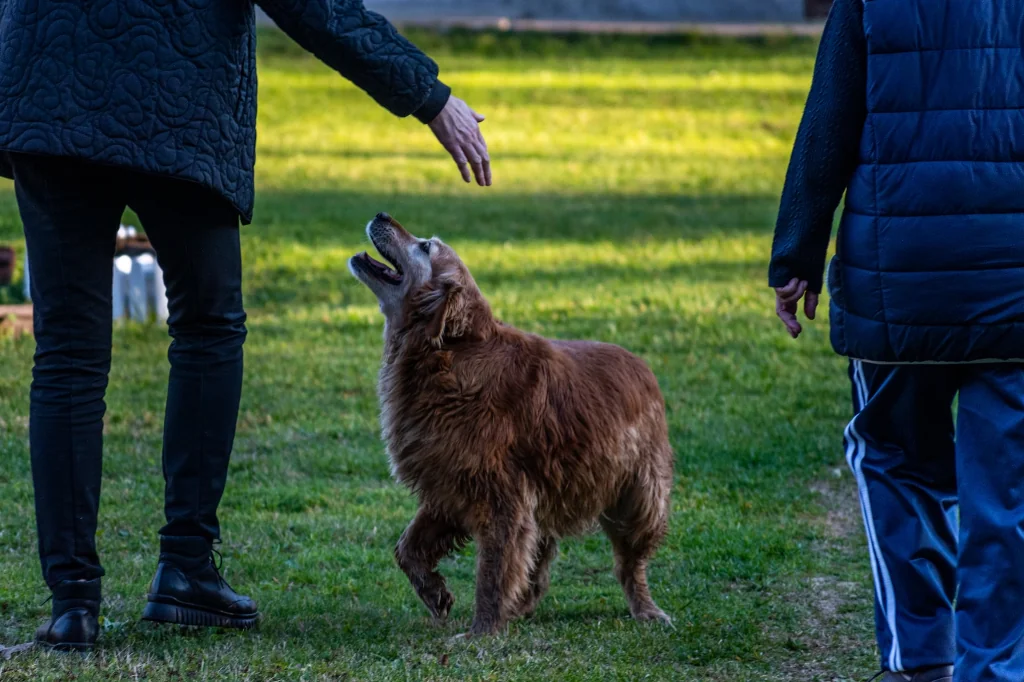Are the barks, whines, and sprints around the house leaving you at your wit’s end?
Or perhaps the constant digging in the backyard has turned your lawn into a moonscape? Figuring out why your dog is behaving this way if often a challenging puzzle. That’s where a dog behaviorist comes in.
But one question looms large in your mind: How much does a dog behaviorist cost? We know, it’s not just about finding help, it’s also about navigating the costs involved. But fear not, we got you covered.
In this guide, we’ll not only break down the costs involved but also give you tips on how to make this investment worthwhile. So, let’s dive in. We promise, by the end of this, you’ll have a better grip on your pet’s needs and your budget. Because a happy dog and a relieved owner is a duo we’d love to see!

When Should Your Dog See a Behaviorist?
There are several signs to watch for that may indicate it’s time for your pooch to visit a behaviorist.
Aggressive or fearful behaviors, such as growling at other dogs or cowering from strangers, can be a clear indication.
Similarly, a sudden change in your dog’s regular behavior like excessive barking, destructive chewing, or house soiling may suggest an underlying issue that needs professional attention.
Think of it like this: a behaviorist is to a dog what a psychologist is to a human. They dive into the canine psyche to understand and address behavior issues that may stem from fear, anxiety, or even past trauma.
My own experience with a dog behaviorist revolved around my first pup, Sammy. This was way back. Sammy was a rescue dog and he came to us with a severe case of separation anxiety. Whenever we left the house, he would howl and chew on furniture to the point of destroying several pieces. We were at our wits’ end, but the decision to bring in a behaviorist made all the difference.
The behaviorist came to our house, assessed Sammy, and created a unique treatment plan. Over the following weeks, Sammy’s destructive behavior reduced significantly. He became less anxious when we were leaving and would wait patiently for us to come back. I learned so much from this experience, not just about Sammy, but about how to understand and address the root causes of dog behavior.
So if your furry friend seems unusually distressed, behaves aggressively, or displays consistent disobedience, it might be time to consider a professional dog behaviorist. They’re not just there to train your dog, they’re there to help them navigate their world more confidently — for their benefit, and for yours.
Breaking Down the Dog Behaviorist’s Charge
Once you understand the costs associated with hiring a dog behaviorist, you can plan your budget more effectively. Let’s break it down, starting with the initial consultation fee.
Initial Consultation Fee
The first step in working with a dog behaviorist usually involves an initial consultation. This is where the behaviorist gets to understand your dog’s issues and creates a customized treatment plan.
The cost for this service can range from $100 to $300, depending on the behaviorist’s experience and the complexity of your dog’s situation.
Don’t let this initial expense deter you. Remember, this consultation forms the bedrock of the forthcoming treatment strategy, making it crucial to your dog’s progress.
Session Costs
Once a plan is in place, the work begins. Most behaviorists charge per session, with each session lasting between one to two hours.
These sessions can cost anywhere from $50 to $200 per hour. Keep in mind, the severity of your dog’s behavior can determine the number of sessions needed.
Follow-up Sessions
After the initial sessions, follow-up sessions may be required to reinforce the behavioral changes and adjust the treatment plan as necessary. These are usually shorter and less expensive, often ranging from $30 to $100 per session.
These sessions ensure your dog maintains the positive changes made during the treatment.
Additional Costs
It’s important to remember that there might be additional costs such as travel fees if the behaviorist is coming to your home, or costs related to training materials and tools. Always ask your potential behaviorist about any extra charges to avoid surprises.
Packages and Discounts
Some behaviorists offer package deals for multiple sessions or discounts for long-term commitments, which can reduce the overall cost. So, don’t hesitate to ask about such offerings. You might just snag a great deal!
Geographical Variations
Lastly, your location might affect the fees and costs. For instance, behaviorists in larger cities or metropolitan areas might charge more due to higher operational costs.
Here’s a brief table to summarize these charges:
| Fee Type | Typical Cost |
| Initial Consultation | $100 – $300 |
| Session Costs (per hour) | $50 – $200 |
| Follow-up Sessions | $30 – $100 |
| Additional Costs | Variable |
An important aspect to consider when looking at these costs is pet insurance. Some pet insurance policies may cover part or all of the costs of a dog behaviorist, especially if the behavior is linked to a medical issue. To find out if your policy covers these services, review your policy details or contact your insurance provider directly. It’s always worth checking, as this could substantially reduce out-of-pocket expenses.
Every dog and situation is unique, so costs can vary widely. But understanding these typical charges will help you budget appropriately when considering the services of a dog behaviorist.
Investing in your dog’s behavior now can circumvent expensive issues in the future and contribute to a healthier, happier life for your pet. Trust us, the tail wags and contented snores will be worth it!
Is Hiring a Dog Behaviorist Worth the Cost?
Looking at your precious fur-baby, you might find yourself asking, “Is hiring a dog behaviorist really worth it?” The short answer is yes, and the reasons might not be as apparent as you think.
Beyond immediate behavior correction, a dog behaviorist can provide lifelong skills and improvements for your pet. They look at the root cause of behaviors, not just the symptoms. This means they can tackle deep-seated problems, leading to long-term positive changes rather than short-lived fixes.
Investing in a dog behaviorist isn’t just paying for obedience—it’s paying for your dog’s overall well-being.
Furthermore, hiring a dog behaviorist can also relieve the stress and strain on your relationship with your pet. Behavior issues can lead to tension in the household, and by addressing these issues professionally, you can enhance the bond between you and your dog.
Here’s something many people might not consider: Dog behaviorists can also prevent costly damage to your home. If your dog’s destructive behavior is a problem, hiring a behaviorist can actually save you money in the long run by preserving your furniture, shoes, or garden!
How Do You Find a Qualified Dog Behaviorist?
In the sea of dog professionals, finding a qualified dog behaviorist might feel like finding a needle in a haystack. But, don’t worry, we’re here to help.
Firstly, look for certification. Certified Applied Animal Behaviorists (CAABs) or a Veterinary Behaviorists (Dip ACVB) have completed rigorous education and training standards. They’re the cream of the crop in the field of animal behavior.
You can find the CAABs in the Animal Behavior Society CAAB directory, as well as in the American Veterinary Society of Animal Behavior’s directory. Here are the exact places where to find these qualified dog behaviorists:
- ABS’s CAAB directory
- AVSAB’s Behavior Consultants Directory
- ACVB’s Diplomates Dip ACVB directory
Next, ask for referrals from your local vet. They work closely with the pet community and often know the best professionals in town.
Alternatively, reach out to local pet rescue organizations or dog clubs for their recommendations. They usually have hands-on experience with behaviorists and can provide practical insights.
Here’s a lesser-known tip: Look for a behaviorist who specializes in your specific issue. Dog behaviorists often focus on certain behaviors or breeds. If your dog is struggling with separation anxiety, for example, find a behaviorist who specializes in that area. This ensures your pup gets the most tailored and effective treatment.
Remember, the best behaviorist for your dog will depend on your dog’s needs, your budget, and your personal preferences. The perfect fit might take some searching, but the improved harmony in your home will make it well worth the effort.
Are Dog Behaviorist Services Tax Deductible?
This is a question often asked by pet owners considering hiring a dog behaviorist.
It’s important to note that in most cases, the costs of dog behaviorist services are not tax-deductible. The IRS generally only allows deductions for expenses related to business, not personal or family expenses.
However, if your pet is a certified service animal or if you run a business that involves your pet, some pet expenses could be considered business expenses and may be tax-deductible.
For more accurate information, we suggest consulting with a tax professional or your local tax office.
Dog Trainer or Behaviorist: Which One Does Your Dog Need?
Deciding between a dog trainer and a behaviorist largely depends on what your dog needs.
Dog trainers primarily focus on teaching dogs new commands, behaviors, or skills, like sit, stay, or heel. They’re great for basic obedience training or if you want your dog to learn some impressive party tricks.
On the other hand, a dog behaviorist is more like a psychologist for dogs. They work with more complex behavioral issues such as aggression, phobias, separation anxiety, or compulsive behaviors. If your dog is exhibiting problematic behaviors that stem from emotional distress or are causing distress, a behaviorist is usually the better choice.
A tip from experience: sometimes it’s not an either/or situation. You might need a trainer for basic obedience and later a behaviorist if other issues emerge. Or, you might work with a behaviorist and also need a trainer for reinforcement of basic commands. Your dog’s needs will evolve, and so should your approach.
Final Thoughts
It’s said that dogs are man’s best friend, but sometimes, even best friends can have communication issues. It’s at times like these when professionals, like dog behaviorists, can be a godsend. Yes, it may seem like a substantial upfront cost, but the value it brings to your relationship with your pet is priceless.
Remember, the path to your pet’s happiness isn’t a straight line. It’s a journey, full of detours and crossroads, and a professional guiding hand can make the travel so much smoother. So, when in doubt, don’t shy away from reaching out to experts. Your dog’s joy is worth every penny and every effort.
FAQs
Is there a money-back guarantee if my dog’s behavior doesn’t improve?
Some dog behaviorists might offer satisfaction guarantees or partial refunds if improvement is not observed, while others may not. Always discuss this with potential behaviorists during your initial consultation and ensure any guarantees are clearly stated in your agreement.
How can I find a reputable dog behaviorist?
To find a reputable dog behaviorist, look for certifications, seek referrals from local vets, rescue organizations, or dog clubs, and consider their specialization in specific behavioral issues.
What qualifications should a dog behaviorist have?
A qualified dog behaviorist should ideally have certification such as Certified Applied Animal Behaviorist (CAAB) or Veterinary Behaviorist (Dip ACVB). They should also have practical experience and a good reputation within the pet community.
Are there alternatives to hiring a dog behaviorist?
Alternatives to hiring a dog behaviorist include attending group dog training classes, using online behavior modification courses, and reading authoritative books on dog behavior. However, these should not replace professional help for severe behavioral issues.
Can I solve behavioral issues on my own without a professional?
Solving behavioral issues on your own without a professional depends on the severity and cause of the issue. While minor issues can often be addressed with proper training and patience, serious or persistent problems usually require professional intervention for effective resolution.
Alex, a passionate animal lover, has experience in training and understanding animal behavior. As a proud pet parent to two dogs and three cats, he founded AnimalReport.net to share insights from animal experts and expand his knowledge of the animal kingdom.




